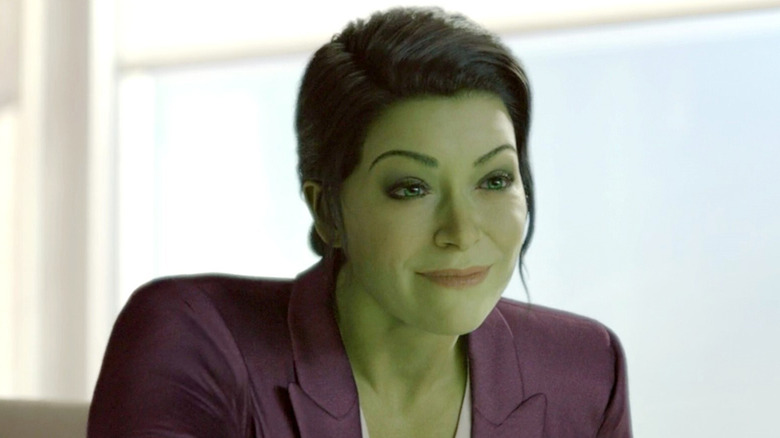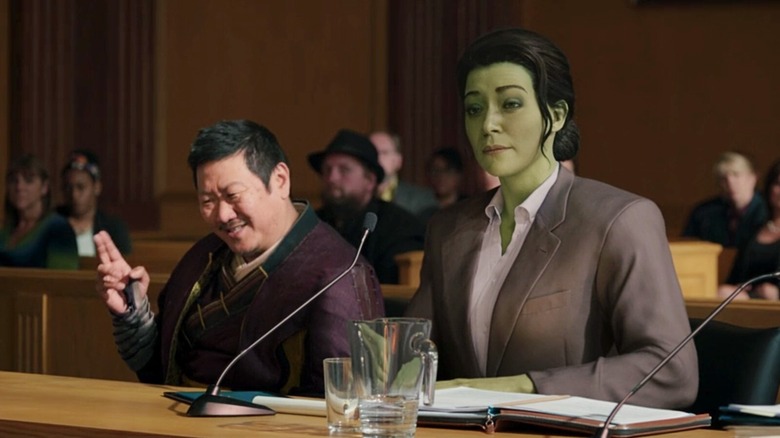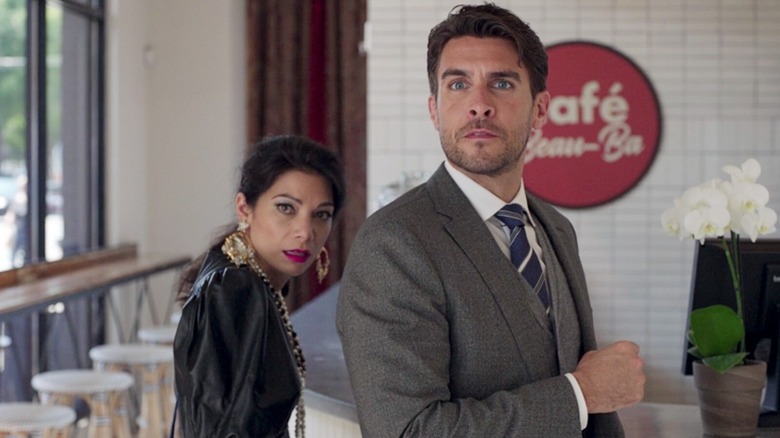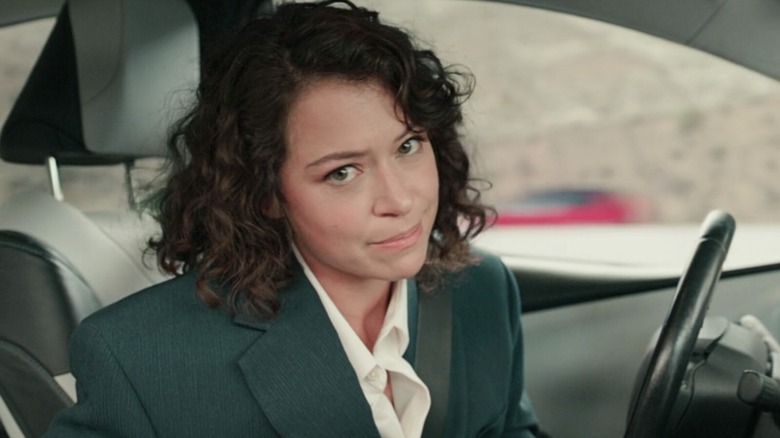Did Disney+ Make She-Hulk Stronger By Releasing It Weekly?
Depending on the fan you ask, the Marvel Cinematic Universe has been very hit-or-miss of late. The shaky future of the MCU has put exponential amounts of pressure onto each new project on the slate, especially those premiering on Disney+. And I'll admit, it was easy to write off its latest effort before the first episode had even aired. "She-Hulk: Attorney at Law" had a lot to live up to. The fact that our titular hero was a legacy character — one connected to an OG Avenger, at that — saddled the show with scrutiny from the jump. Many wondered whether Tatiana Maslany's She-Hulk would be able to escape from the shadow of the Incredible Hulk (Mark Ruffalo), and whether all the interesting creative choices teased during the series' promo run would pay off the way the writers hoped.
Fast forward a few weeks, and "She-Hulk" has become something of a quiet triumph. Sure, the fourth wall-breaking took some getting used to, as did its low-stakes, loosely-connected storytelling. The first half of its nine-episode season was also stuffed with dated "girl power!" zingers and exuberant gestures to toxic masculinity, neither of which felt particularly effective. It took a minute for everything to click into place, but now that it's had some time to marinate, "She-Hulk" gets better each week. It's one of the few Disney+ series that seems to benefit from a weekly release. But given the fact that it took so long to find its footing, would it have gotten more out of releasing all its episodes at once?
The limits of modern storytelling
In today's era of Bingeworthy TV, it's difficult for a series to make a lasting impression, much less sustain it over several weeks. In the beforetimes, television had the benefit of a 12 or even 20-episode season and the freedom to build out its story by releasing one episode each week. Disney+ has been toiling to reinstate that status quo since the premiere of "The Mandalorian" in 2019, but in the case of that series — and so many others on the platform — a weekly release schedule often hurts it more than it helps.
Shows like "Obi-Wan Kenobi" and "The Falcon and the Winter Soldier" feel more like movies broken up into six-episode installments. (That's not always a bad thing, but at that point, why not just make a movie?) Even the series that employ an episodic storyline either take multiple episodes to nail their emotional hook or drop those stakes somewhere along the way. In either case, the ideas are often there, but most Disney shows lack the direction they desperately need to engage audiences that aren't already stuck into their fandom of choice.
A little help from her friends
So what makes "She-Hulk" different? For one, it's the first live-action Marvel show since "WandaVision" to abandon the six-episode format entirely. Getting more time to establish your characters is certainly a plus, but even with the advantage of three more episodes, "She-Hulk" was fast on its way to becoming yet another Marvel series with an identity crisis. The show initially seemed more concerned with its superhero storyline than the emotional bonds between its characters. It kicked things off with a tedious dive into Jen Walters' origins as She-Hulk, which cheapened the stakes in every way that mattered.
As we'd learn later though, that wasn't at all how "She-Hulk" was supposed to start out. An episodic switch-up in post-production moved Jen's origin story to the front of the line, causing a chain reaction in the episodes that followed. But with that wrinkle out of the way, "She-Hulk" was able to pivot back to "human" storylines that focused more on Jen, her family and friends, and her love life and her career. It brought out the best in Tatiana Maslany and her hilarious supporting cast, and it's made "She-Hulk" infinitely more enjoyable in its later episodes.
So what's the verdict?
Now, I know what you're thinking. That's all well and good, but would "She-Hulk" have gone over smoother if all the episodes had dropped at once? The short answer: Not necessarily. Shows released under the binge model aren't guaranteed viral success, especially since those that fail to make a real impact are forgotten about much quicker. Netflix can release entire seasons for shows like "Stranger Things" and "Bridgerton" because the hype for those shows is already built in. Something like "She-Hulk," on the other hand — a show on a different platform, with a more obscure legacy character and a finicky fanbase — might have flopped immediately.
A weekly release has actually given "She-Hulk" a chance to pick up some positive word of mouth, especially after it'd been all but dismissed upon its premiere. The stakes are also much lower for a show that can take its time. And frankly, it's gratifying (and a bit humbling) to watch this show blossom into something better and better each week. It's been an exercise in patience, for sure, but for a fandom so used to getting its way, it's definitely a welcome change.
"She-Hulk" isn't the first series that needed a little time to get good. We're a bit removed from the days where your favorite show required a disclaimer ("It gets so good after the second season, I swear!") to get people on board. But with so much content out there, it's much easier to write off a show if it doesn't instantly work. "She-Hulk," thankfully, gained some staying power by dropping one episode a week, and though its first season is already wrapping things up, the journey to the finish line has been half the fun.
"She-Hulk" is currently streaming on Disney+, and new episodes arrive on Thursdays.



